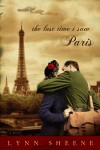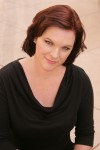The Last Time I Saw Paris by Lynn Sheene
 by L.J. Sellers
by L.J. Sellers
 Writing great fiction is a craft, and Lynn Sheene is proof. She penned the first chapter of her debut novel, The Last Time I Saw Paris, in the Writers Studio of the UCLA extension program and finished it in follow-up classes. The novel releases this month and is already drawing rave reviews. “Sheene is a powerful writer and I cannot wait to read whatever comes next,” says Rebecca Cantrell, award-winning thriller author.
Writing great fiction is a craft, and Lynn Sheene is proof. She penned the first chapter of her debut novel, The Last Time I Saw Paris, in the Writers Studio of the UCLA extension program and finished it in follow-up classes. The novel releases this month and is already drawing rave reviews. “Sheene is a powerful writer and I cannot wait to read whatever comes next,” says Rebecca Cantrell, award-winning thriller author.
A longtime Francophile, Sheene became fascinated with the drama of 1940s Occupied Paris when she discovered a French Art Deco brooch. Captivated by the jewel’s possible wartime past, she began to study the intriguing and dangerous time through research trips, memoirs and news accounts.
In the story, Claire Harris flees a glamorous Manhattan life built on lies and arrives in Paris with a romantic vision of starting anew. Her plans smashed by the German occupation, the socialite’s only option becomes a job with a sophisticated Parisian florist. In exchange for false identity papers, Claire agrees to aid the French Resistance. But deception and betrayal force her to flee once again—this time to fight for the man she loves and what she knows is right.
Sheene tells us in her own words about writing The Last Time I Saw Paris.
Your story is set during WW2; what motivated you to write about this period?
I’ve always loved the 1930’s and 1940’s—the culture, the music, the clothes, the jewelry. Definitely the jewelry. I’ve also been a Francophile for a many years time. But it wasn’t until those two things came together and sparked that I found my writing era. To me, Paris is the most beautiful place in the world. But under the German Occupation, the city was dark, hungry, desperate, and oppressed. But also heroic.
How did you conduct your research?
I conducted much of my research online. I can’t imagine how I could have done that extensive of research without the internet. So many people have shared their stories with amazing detail online. I’ve also read many, many journalistic accounts of that era, many memoirs, and even newspapers articles from that time.
My favorite research, of course, is in Paris. I just came back from a month in Paris early this year, researching my second book. Paris is always magical but I walked where my characters walked, visited where my characters met, lived, ate, and even died. And of course, I spent hours in places like Bibliothèque historique de la ville de Paris studying archives, photos and maps. I loved every second of it!
Are the characters based on any real people or are they pure imagination?
The characters are inspired by real people, but are truly from my own imagination. For example, my protagonist Claire was inspired by women I discovered in a book about famous jewelry collections—women who were born poor but used their beauty and strength to scratch their way up to jewels that rivaled royal houses of Europe. That level of hunger and that ability deeply intrigued me.
 What do you want readers to take away from the story?
What do you want readers to take away from the story?
One of the most intriguing aspects of the story for me is that the people in Paris who resisted the Nazis, of which many were arrested, tortured and killed, were like you and me. They weren’t soldiers. They weren’t trained. They were normal men and women, the type that might spend an afternoon in a bookstore. It makes me wonder what I would do in their place. Would I be heroic, even knowing that I or my family might pay for it?
Did your career as an environmental consultant and science writer prepare you in any way for the fiction you would eventually write?
I think my science consulting and writing helped my fiction writing in two big ways. First, I knew how to do research. I understood what level of knowledge I personally needed on a subject before I could write about it, and I was used to poring through journals, online resources, and libraries to find that knowledge. Secondly, nearly everything scientific I wrote was for someone else, a client, a university, etc., so I learned how to write the best I could, take edits, and let it go.
What are you working on now?
I am working on my second book. This novel is set in the same world as The Last Time I Saw Paris: German-Occupied France. A young ballerina goes undercover to spy for British intelligence as a cabaret dancer in Paris while searching for missing family. When a smitten Nazi officer brags to her about a naval advance that could hand the war in the Atlantic to the Germans, she is forced to partner with a mercenary French Count, risking her life and the lives of countless sailors to a man she cannot afford to trust.
What genre do you like to read and who are your favorite authors?
I love historical fiction and I love suspense, so when those two are mixed together, I am a happy woman. My favorite author and historical suspense hero is Alan Furst. He is lyrical, evocative, and bit melancholy. Truly brilliant.
For more information, please visit Lynn Sheene’s website.
- Don’t Look Now by Michelle Gagnon - July 31, 2013
- Unseen by Karin Slaughter - June 30, 2013
- The Trade by Colby Marshall - May 31, 2013
